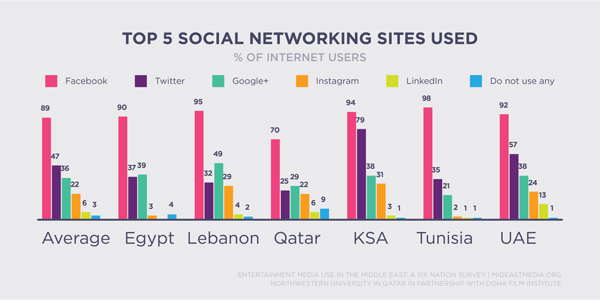How people in the Middle East use social media and entertainment media
Posted by: Damian Radcliffe
New research from Northwestern University in Qatar has shed fresh light on how residents of Qatar, Saudi Arabia, Lebanon, Egypt, Tunisia and the United Arab Emirates use social networks and entertainment media.
The survey, which followed on from a 2013 study into broader media use, revealed that respondents often cite news as one of their favorite entertainment genres. From a sample of just over 6,000 individuals, this conclusion was shared by 51 percent of respondents in Lebanon, 44 percent in Qatar and 40 percent in Tunisia.
Other insights include the volume of Western media content consumed in the region, as well as strong attitudes towards it. 71% of Arabs, for example, feel Arab films and television are good for morality, but only 15% feel the same about films from the US. More broadly, 34% feel Hollywood films and television are harmful for morality, despite two-thirds (66%) of also saying that people benefit from watching content from different parts of the world.
For Everette E. Dennis, Dean and CEO of Northwestern University in Qatar, “these apparently contradictory findings really are not.” Instead he argues that they simply reflect the complexity of “how the Arab world is coping with globalization and still grappling to preserve local culture.”
It is in this light, that one should also view the strong desire of respondents to preserve cultural traditions. Across the six nations featured in this study, 79% of survey participants felt that more should be done to preserve these traditions, with a similar percentage (70%) agreeing with the view that more should be done to integrate their respective cultures within modern society.
The role of social media in this mix is a potentially an interesting one; although not one which the report examines in this way.
By offering a platform for discourse, personal and political expression, these communication channels can sometimes be seen as a source of content at odds with these traditional values. At the same time, they can also be a means to reinforce these tenets. The popularity of a number of high profile religious leaders on Twitter demonstrates just one way in which modern technology is being harnessed as a means to promote – and discuss – the meaning of traditional values in a digital age.
For Middle East watchers, the role of social networks in the region as an agent for change has provoked much discussion; particularly in the immediate aftermath of the Arab Spring in 2010-11. Three opposing views can be found, for example, in Malcolm Gladwell’s “Small change – why the revolution will not be tweeted”, John Pollock’s “Streetbook – how Egyptian and Tunisian youth hacked the Arab Spring” and Clay Shirky’s essay on “Technology, the public sphere, and political change“.
Whatever your view, there is no doubting the popularity of these networks amongst Internet users in the region, a conclusion reinforced by Northwestern’s study.
As the chart below shows, Facebook’s influence in this sphere is very strong, with the social network enjoying over 90% penetration in most markets; considerably more than most other platforms.
Instagram, which is also part of the Facebook family, is also a popular service. Although take-up varies more widely than the older, more established, mother site. Part of the reason for this variance is economic. The Gulf States enjoy much higher levels of smartphone penetration, a technology which lends itself more to the visual nature of Instagram. So, it is perhaps no surprise to see that Instagram is considerably less popular in countries like Tunisia and Egypt, where smartphone usage is much lower.
 Drilling down further, the other striking conclusion from this top-line analysis is the variance – at a national level – in the Kingdom of Saudi Arabia (KSA) and Qatar from wider regional trends.
Drilling down further, the other striking conclusion from this top-line analysis is the variance – at a national level – in the Kingdom of Saudi Arabia (KSA) and Qatar from wider regional trends.
Saudi, for example, enjoys a much higher penetration of Twitter, where the number of users (as a % of the Internet population) is more than double most of the other countries surveyed.
Home to 28 million people, and with mobile penetration levels in excess of 200% (the highest in the world), Saudi is the origin for just over half of the Middle East’s 3.7 million Twitter users, and it is also the source for almost half the tweets produced across the in the region each day. 90% of them in Arabic.
Data from the Dubai School of Government’s 5th Arab Social Media Report, which was published last summer, also showed that in the previous year 500,000 people in Saudi Arabia had left Facebook (perhaps for Twitter), suggesting that Facebook fatigue is not just a Western phenomenon.
In Qatar, my home since 2012, Facebook isn’t even the most popular network with Nationals. Instagram is. Qataris are more likely to use Instagram (46%) than Twitter (37%) and Facebook (36%). Amongst younger Internet users take-up of Instagram tops 50%, a statistic which probably surprises nobody who lives here, but may well do if you do not.
What these few examples demonstrate is the complexity of aggregated data in this heterogenous region. As the report authors note, usage of social networks “varies considerably by subsets of the population.”
For example, “Twitter is much more popular with U.S. and European expats than those with Arab origins or Asian expats (70%, 48%, and 35%, respectively),” investigators conclude. “However, there are country variations. In the UAE, Western expats use Twitter more than all other residents (81% vs. 57%). [But] Twitter is equally popular among all groups in Saudi Arabia.”
Given these variables, I would encourage anyone interested in finding out more about this part of the world to explore both the full report from Northwestern and their interactive website. The latter allows you to manipulate the data to accommodate variables such as nationality, age and gender, a device which quickly allows you to see the diversity of this region.
You can find both the report and the interactive site at: mideastmedia.org
——————–
Damian Radcliffe is an Honorary Research Fellow – and PhD scholar – at the Cardiff School of Journalism, Media and Cultural Studies and a Fellow of the Royal Society for the encouragement of Arts, Manufactures and Commerce.
Based in the Middle East, he is Section Head, Digital Impact & Emerging Technologies at the Ministry of Information and Communications Technology (ictQATAR), where he leads ictQATAR’s “Rassed” research program, which studies the impact of the Internet and ICT on society; and the potential of emerging digital technologies.
You can follow him on Twitter @damianradcliffe where he typically tweets about digital developments in the Middle East, as well as hyperlocal media and community journalism.


